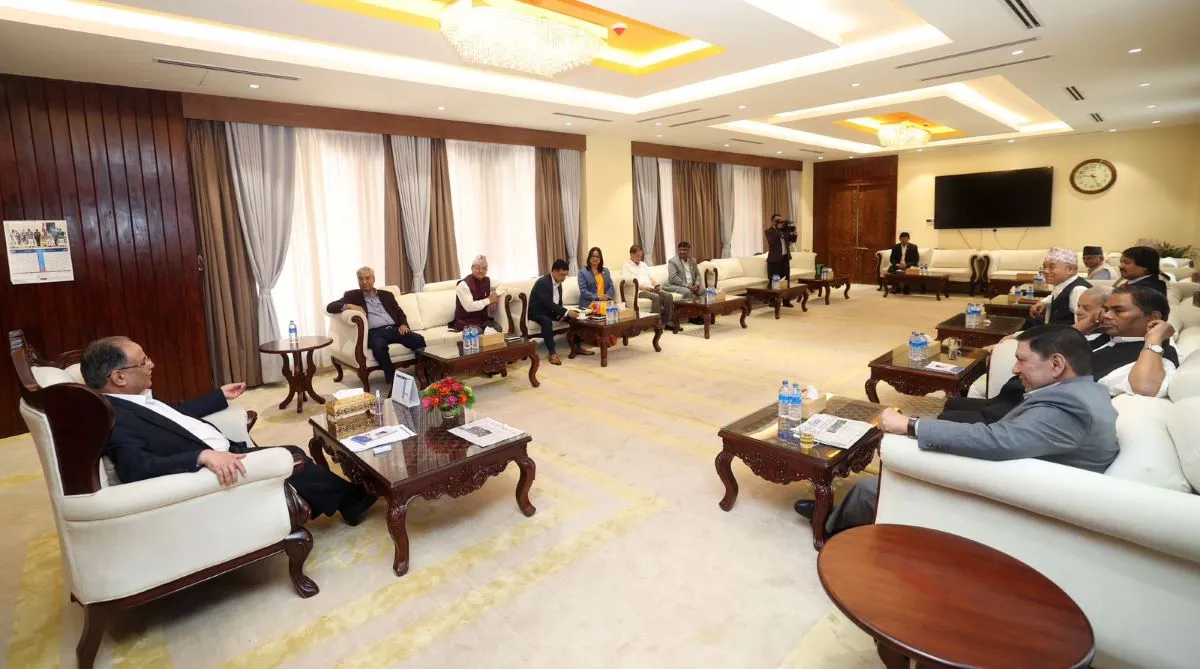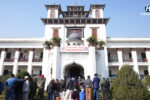KATHMANDU: With the National Assembly (NA) elections scheduled for January 25, the ruling coalition finds itself facing a formidable challenge in determining candidates for the crucial 19 seats.
Despite frequent discussions among coalition leaders in Baluwatar, a decisive conclusion has remained elusive, causing mounting concern within the ruling alliance.
Meanwhile, the opposition CPN-UML has capitalized on the disarray within the ruling coalition, devising a strategy to secure victories by exploiting discontent.
In pursuit of this goal, the UML has strategically introduced the ‘TRC Bill’ as a political card.
Although the seven parties in the ruling coalition have committed to forming an alliance for the National Assembly elections, a consensus on seat allocation continues to elude them.
Independent MP Dr. Khimlal Devkota advocates for the party to acquire all three seats as the positions of three MPs from the Unified Samajwadi Party will become vacant.
Confusion persists among coalition leaders regarding the distribution of quotas among the provinces for each party.
Prime Minister (PM) Pushpa Kamal Dahal Prachanda has been engaged in discussions with the ruling parties, attempting to navigate through the intricate negotiations.
On Tuesday morning, Prime Minister Dahal and Nepali Congress President Sher Bahadur Deuba conferred in Baluwatar, Prime Minister’s official residence.
Subsequent discussions were held in the afternoon, involving Deuba, PM Dahal, and KP Oli.
According to the Prime Minister’s Secretariat, ongoing deliberations between Prachanda and Deuba focus on determining the allocation of National Assembly seats to each party within the Congress-Maoist alliance.
Notably, Prime Minister Dahal and Deuba engaged in a lengthy conversation lasting about two hours in Baluwatar on Friday morning.
Sources indicate that Nepali Congress President Deuba, Vice President Purna Bahadur Khadka, General Secretary Gagan Thapa, and Chief Whip Ramesh Lekhak participated in the discussions in Baluwatar.
Prime Minister Dahal represented the Maoist Center in these crucial deliberations.
In the meeting, the NC’s second-ranking leader pressed for the inclusion of the National Assembly Speaker’s seat within the Congress, a demand endorsed unequivocally by the Prime Minister.
Challenges in Allocation
The ruling coalition, comprising Nepali Congress, CPN-Maoist Center, Janata Samajwadi Party, Unified Socialist, Nagarik Unmukti Party, Janamat Party, Loktantrik Samajwadi Party, and Rastriya Janamorcha, grapples with the intricate task of seat allocation.
Of the 20 seats in the National Assembly set to be vacant on March 4, party leaders advocate that 8 should be apportioned to the Nepali Congress.
As the term concludes, the current distribution in the National Assembly stands at 9 MPs from UML, 4 from Nepali Congress, 3 from Maoist Center, 3 from the Unified Socialist Party (including Khimlal Devkota), and 1 from Janata Samajwadi Party.
The upcoming election on January 25 aims to elect 19 MPs to the National Assembly, with a constitutional provision allowing the President to nominate one based on the Council of Ministers’ recommendation.
Per the existing agreement among coalition parties, there is a proposal to allocate 9 seats to UML while retaining its lost seats. However, consensus within the ruling party remains elusive.
Should the ruling parties unite, winning the 9 MP seats vacated by UML seems assured.
The Nepali Congress claims 4 of these seats, but other parties contend that it should secure only 7, including the chairman, leaving 4 for themselves and 3 for UML.
Maoists have staked a claim to an additional 3 seats from the center, but speculations suggest they might secure only 2.
Despite Jaspa’s request for 3 seats, ongoing alliance discussions contemplate granting him only one or two.
The tenure of NC’s Ramesh Jung Rayamajhi, UML’s nominated MP Bimala Rai Paudyal, and Maoist’s Bina Pokharel from the Koshi region is ending, necessitating the election of 2 individuals from this province.
The Unified Samajwadi Party seeks retention of its existing 3 seats and an additional two seats.
However, the Nepali Congress and Maoists propose offering only one more seat.
Independent MP Dr. Khimlal Devkota advocates for the party to acquire all three seats as the positions of three MPs from the Unified Samajwadi Party will become vacant.
Furthermore, Resham Chaudhary of Nagarik Janamat Party confirms an agreement to allocate one seat to the party within the coalition.
Additionally, the alliance leaders are gearing up to share one seat, to be nominated by the President.
In a contrasting demand, CK Raut’s Janamat Party, a component of the ruling coalition, insists on securing a seat in the National Assembly.
Raut asserts that he is willing to withdraw from the government if the seat is not granted.
In the initial phase, Prime Minister Dahal is set to engage in separate discussions with leaders of the power partner parties.
Following internal deliberations, the top leaders of the alliance will convene to allocate seats.
Once the number of seats allotted to each party is determined, internal decisions regarding candidates will follow.
Leaders affirm that the alliance’s candidacy for the National Assembly is certain.
Upendra Yadav, the Chairman of Janata Samajwadi Party, asserts that his party has not yet discussed the candidate selection process.
Madhav Nepal, Chairman of Unified Socialist Party, remarks, “The specific provinces for the members of this party to contest in are yet to be decided in our meetings.”
How many seats are vacant in each province?
The tenure of NC’s Ramesh Jung Rayamajhi, UML’s nominated MP Bimala Rai Paudyal, and Maoist’s Bina Pokharel from the Koshi region is ending, necessitating the election of 2 individuals from this province.
In Bagmati, UML’s Dilkumari Rawal and Ram Chandra Rai, along with Unified Samajwadi Party’s Singh Bahadur Bishwakarma, are approaching the end of their terms.
Similarly, the tenure of Khimlal Devkota, an independent member elected from Bagmati province, is also concluding. Elections are slated for 4 posts in this province.
From Madhes, JSP’s Pramila Kumari and Congress’s Jitendra Narayan Dev are concluding their terms, prompting elections for 2 posts in this province.
In Gandaki province, UML’s Ganesh Timilsena and Deepa Gurung, along with Congress’s Prakash Panta, are reaching the end of their tenures. Elections will be held for 3 seats from Gandaki.
Lumbini sees the conclusion of the terms of Congress’s Anita Devkota and UML’s Kumar Dasoudi, necessitating elections for 2 posts in this province.
In Karnali Province, UML’s Narapati Luwar and Bhairav Sundar Shrestha, along with Unified Socialist Party’s Nanda Chapagai, are nearing the end of their terms.
Elections will be held for 3 posts from Karnali.
Moreover, the terms of Maoist Center’s Hariram Chaudhary and Mahesh Kumar Mahara from the Sudurpaschim Province, along with UML’s Indu Kadariya, are ending.
Elections for 3 positions in the National Assembly from this province are on the horizon.
Divergent Claims Among Fringe Parties
Upendra Yadav, the Chairman of Janata Samajwadi Party, asserts that his party has not yet discussed the candidate selection process.
However, he anticipates that the alliance will address this, leading to the finalization of names.
Yadav stated, “There is no problem for us. After the alliance meeting, we will promptly provide names once the seats are determined. We will proceed as per the agreement. So far, the Prime Minister has not initiated a discussion. In Nepal, everything tends to conclude at the last moment.”
Is Prime Minister Dahal considering an alliance with Oli in the National Assembly due to the Nepali Congress not allocating sufficient seats?
Spokesman Manish Suman reveals that the JSP’s Executive Committee meeting deliberated on candidate selection.
However, with the alliance yet to allocate seats, confusion persists about candidates’ provinces of origin.
One National Assembly seat of JSP from the Madhes Province is slated to become vacant.
The coalition plans to offer JSP one seat lost by UML, potentially resulting in JSP securing two seats.
Meanwhile, Madhav Nepal-led CPN Unified Socialist Party has proposed three leaders for the National Assembly elections.
The Samajwadi Party, demanding four seats, is considering including Ganesh BK in one seat under the Dalit quota.
Additionally, the party is likely to nominate Vice-President Prabesh Hamal, Ghanendra Basnet, and Deputy General Secretary Gangalal Tuladhar as National Assembly candidates.
Although the official decision remains undisclosed, sources from the party told Khabarhub that these individuals will be selected under the same nomination.
However, the Unified Socialist Party has recently brought the name of the party’s general secretary, Ghanashyam Bhusal, into consideration.
Jagannath Khatiwada, head of the party’s publicity department, clarified, “The names have not been finalized. The party has made some preparations, but it’s subject to change.”
On another front, the CPN-UML has devised a strategy to safeguard the 9 seats at risk in the National Assembly, including the Speaker’s position.
Ruling party leaders assert that they are utilizing the Transition Justice Bill (TRC), as a strategic card.
Prime Minister Dahal and UML Chairman Oli held a meeting three days ago, where discussions on the strategy, including the use of the ‘TRC’ card, took place.
Why are Prime Minister Dahal and opposition leader Oli holding meetings in the midst of the National Assembly elections?
A Maoist official informed Khabarhub that the discussion revolves around the Truth and Reconciliation Commission (TRC).
Furthermore, the Maoists intend to align with the ruling coalition in the National Assembly without forming an alliance with the UML.
Addressing the possibility of UML’s participation in the National Assembly through reconciliation, Gyawali comments, “We are not driven by greed for that. Our focus is on saving the nation and preventing hardship for the people.”
Contrastingly, UML leaders express positivity towards the TRC bill, emphasizing a proactive approach to prevent potential issues in the future.
Is Prime Minister Dahal considering an alliance with Oli in the National Assembly due to the Nepali Congress not allocating sufficient seats?
Responding to this query, a UML leader states, “They might have signaled us to attempt negotiations with the Nepali Congress, but the UML is not engaged in such maneuvers. We are supportive of the TRC.”
Meanwhile, Deputy General Secretary Pradeep Gyawali told Khabarhub that the UML is not in the race of breaking the ruling alliance.
He asserts, “We are not pursuing the dissolution of alliances. It appears unlikely. However, discussions are ongoing with representatives at the provincial and local levels for the National Assembly.”
Addressing the possibility of UML’s participation in the National Assembly through reconciliation, Gyawali comments, “We are not driven by greed for that. Our focus is on saving the nation and preventing hardship for the people.”
As of now, the UML has not finalized the candidate for the National Assembly but is prepared to contest in 19 seats.
The UML appears to have crafted a strategy to attract votes from disenchanted parties within the alliance.
Despite the UML’s strength, the coalition holds a stronger position in the National Assembly elections.
Barring political upheaval, it is anticipated that only 19 candidates from the alliance will emerge victorious.









Comment